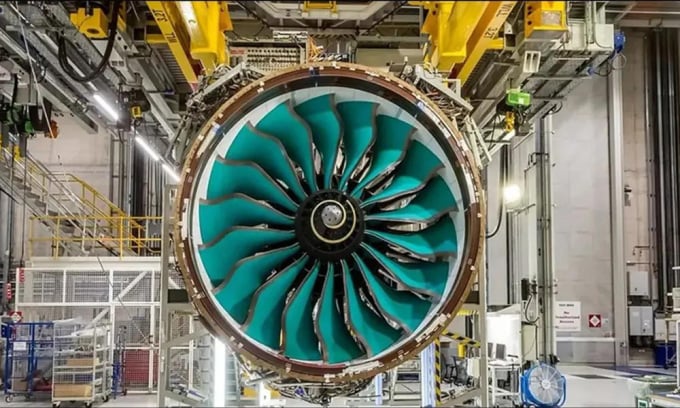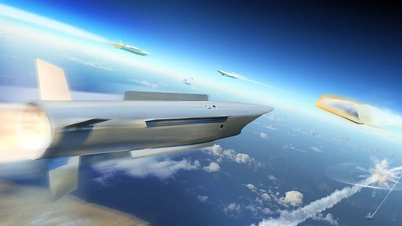Rolls-Royce conducts first test of new UltraFan turbofan engine at Testbed 80 in Derby, UK.

UltraFan is touted as the world's most efficient aero engine. Photo: Rolls-Royce
British company Rolls-Royce claims the UltraFan is the quietest and most fuel-efficient aviation engine ever, delivering about 10% better fuel efficiency than the Trent XWB - the world's most efficient aviation engine today, Interesting Engineering reported on May 20.
The first UltraFan test took place at Testbed 80 in Singing, Derby, with the new engine running on 100% Sustainable Aviation (SAV) fuel, which Rolls-Royce explains is made primarily from raw materials derived from waste, such as cooking oil.
"The UltraFan is the world's largest experimental aero engine, featuring a range of new technologies that deliver greater fuel efficiency, resulting in lower emissions and greater sustainability. These technologies can be scaled up and further developed to create engines with thrusts ranging from 11.3 tonnes to over 45.3 tonnes for narrow-body or wide-body aircraft," Rolls-Royce explained.
The UltraFan features a giant 14-inch diameter fan and a relatively small core, which Rolls-Royce says is key to the new engine's efficiency. The engine delivered 64 megawatts of power during testing and improved fuel consumption by 25 percent compared to competitors like the Trent.
"UltraFan is designed for the future - it will be 100% SAV-ready from day one. In addition, we are actively exploring potential options for hydrogen and hybrid-electric power solutions," Rolls-Royce said.
The new test is a step towards the aerospace sector’s goal of net-zero emissions flights by 2050. The UltraFan project, which is funded by the UK government , was announced in 2014 and is still in development.
“This innovative technology will help support the transition to a greener future for aviation, while also attracting further investment into the UK aerospace sector, helping to grow the economy ,” said Kemi Badenoch, UK Business and Trade Secretary.
Thu Thao (According to Interesting Engineering )
Source link


![[Photo] Hue: Inside the kitchen that donates thousands of meals a day to people in flooded areas](https://vphoto.vietnam.vn/thumb/1200x675/vietnam/resource/IMAGE/2025/10/29/1761738508516_bepcomhue-jpg.webp)

![[Photo] Prime Minister Pham Minh Chinh chaired a meeting to discuss solutions to overcome the consequences of floods in the central provinces.](https://vphoto.vietnam.vn/thumb/1200x675/vietnam/resource/IMAGE/2025/10/29/1761716305524_dsc-7735-jpg.webp)

![[Photo] Prime Minister Pham Minh Chinh chaired a meeting to evaluate the operation of the two-level local government model.](https://vphoto.vietnam.vn/thumb/1200x675/vietnam/resource/IMAGE/2025/10/29/1761751710674_dsc-7999-jpg.webp)
![[Photo] Human love in the flood in Hue](https://vphoto.vietnam.vn/thumb/1200x675/vietnam/resource/IMAGE/2025/10/29/1761740905727_4125427122470875256-2-jpg.webp)







































































![[Live] Concert Ha Long 2025: "Heritage Spirit - Brightening the Future"](https://vphoto.vietnam.vn/thumb/402x226/vietnam/resource/IMAGE/2025/10/29/1761743605124_g-anh-sang-am-thanh-hoanh-trang-cua-chuong-trinh-mang-den-trai-nghiem-dang-nho-cho-du-khach-22450328-17617424836781829598445-93-0-733-1024-crop-1761742492749383512980.jpeg)





























Comment (0)